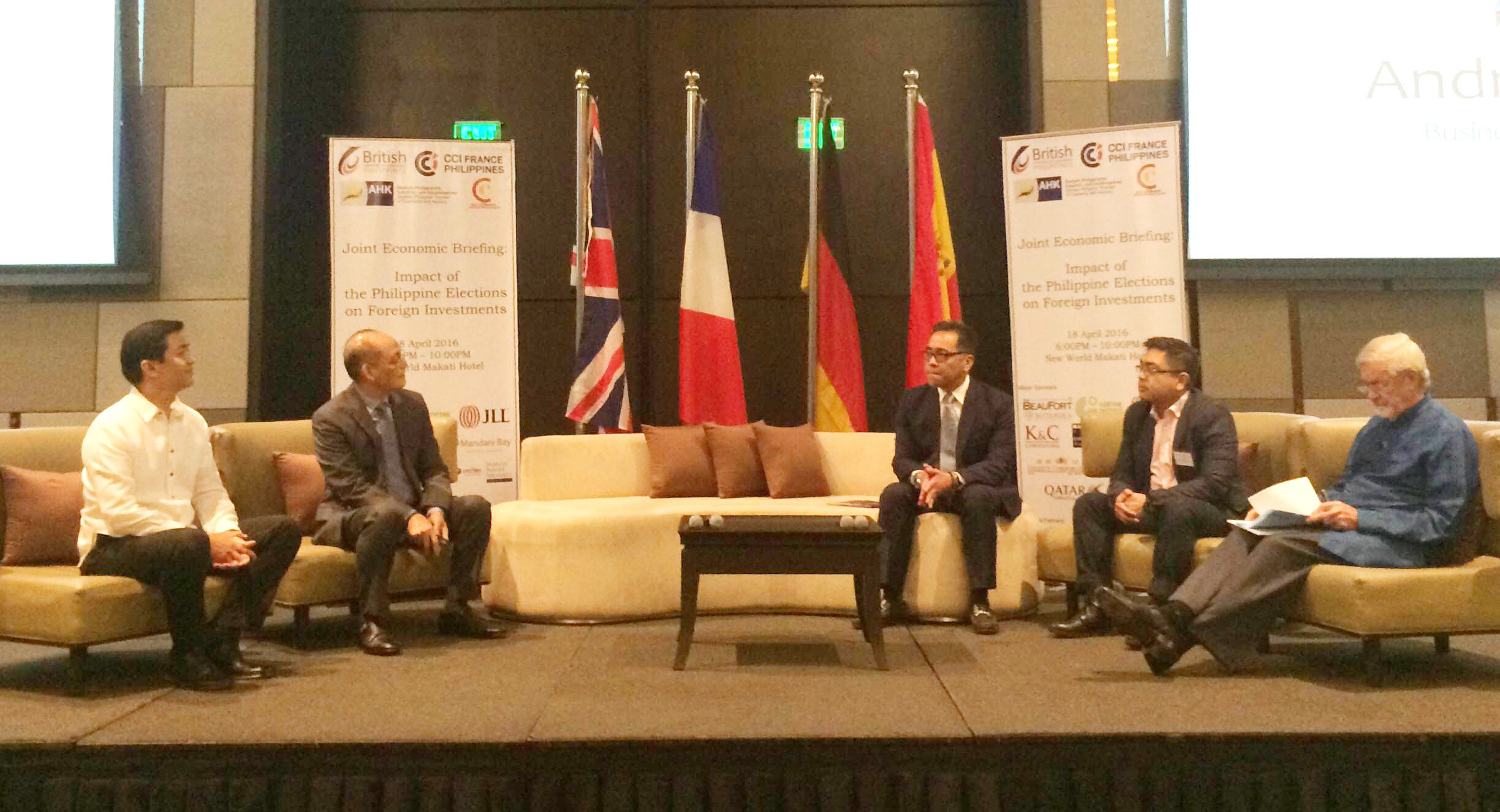SUMMARY
This is AI generated summarization, which may have errors. For context, always refer to the full article.

MANILA, Philippines – Income taxes and limits to foreign ownership – two issues that have long been seen as hurdles for foreign investment – could be resolved within a year, if the next president focuses on these.
This is according to economist Benjamin Diokno, who was budget secretary during the Estrada administration.
“If the new president can form his or her [Cabinet before June] and hit the ground running from day one, then he or she can reform the tax system in 6 months and amend the constitution in a year. If the new president can do both within that time it would be good for the country,” Diokno said on Monday, April 18, at a European Chambers of Commerce forum that tackled the possible impact of the May elections on foreign investment.
The Philippines’ relatively high income taxes, as well as constitutional provisions that limit foreign ownership in the country to a minority 40% for most industries, have long been flashpoints for local economists and the foreign business community.
Both are seen as hindrances to competitiveness. The country has the second highest income tax and highest corporate tax in the Association of Southeast Asian Nations (ASEAN), while foreign ownership restrictions limit the control of foreign investors and create bigger risks in any project.
Unfinished agenda
Diokno said the two issues are part of the “unfinished agenda” of the Aquino administration, and have now become critical for the next administration to address.
Aside from these, boosting the agricultural sector and ensuring that spending on infrastructure hits at least 5% of GDP are crucial to tapping into foreign investment.
All post-EDSA presidents have spent on average 2.3% of GDP on infrastructure, Diokno pointed out, but in the case of the Aquino administration, it operated at a time of unprecedentedly low global interest rates.
“The golden rule is you borrow money when the return on investment on a project is higher than the cost of borrowing, and it’s sad because these are the lowest interest rates I have seen in my lifetime,” he said.
The low interest rates have been a product of the US Federal Reserve keeping them at almost zero for a prolonged period to stimulate the US economy, coming out of the global recession in 2008.
While the economy has grown by an average of 5.9% between 2011 and 2015 under President Benigno Aquino III, agriculture has only grown by 1.6% – the second lowest among all post-EDSA presidents except for the Ramos administration, according to Diokno.
“The sector is critical to inclusive growth as it accounts for 30% of the workforce and the poorest group at that,” he added.
Water, rice, and mining
For Peter Wallace, chairman of the Wallace Business Forum, the agriculture sector is in “terrible shape” and “has some of the silliest policies” in place.
“This administration hasn’t focused on agriculture along with the previous adminstration, and presidential candidates haven’t really been talking about it except in general, fluffy terms,” he added.
One major reform Wallace suggested is to break the monopoly of the National Food Authority (NFA) on rice importation and allow private importation so that farmers could focus on more competitive produce.
“You can produce rice in Thailand and Vietnam at half the cost that you do here. Why grow rice? Grow pineapples, grow bananas, grow other crops that make more money,” he said.
Wallace also suggested the creation of a system of small dams and embankments to store water during the rainy season as a way to combat drought, especially as it has resulted in major crises such as what happened recently in Kidapawan.
“We have to recognize that water is an essential ingredient not only in agriculture but in every area as well,” he said.
The current administration, Wallace added, has also missed a trick with regards to mining, which would contribute to GDP growth and also bring in much-needed employment.
“Getting mining back on track is important. We lost literally billions of dollars by the government not recognizing the value mining can bring to the country,” he said.
But if there’s one priority, Wallace noted, it would have to be the creation of more jobs.
“If everyone has a job, half of the problems will disappear automatically, so that really should be the administration’s major single focus,” he said.
Foreign investment will greatly help in that regard, especially for manufacturing, but continuity will be key.
“One of the most critical things for business is continuity and consistency. We’re sick of whimsical changes that have occurred and that’s very damaging to investment,” Wallace said. – Rappler.com
Add a comment
How does this make you feel?
There are no comments yet. Add your comment to start the conversation.